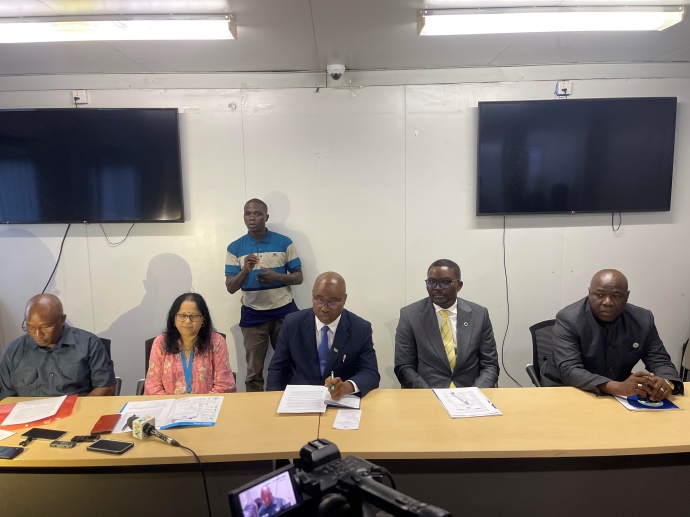By Alvin Lansana Kargbo
The Screening, Consensus Building & Elections Committee (SCBEC), tasked with overseeing the selection of a candidate for the upcoming Kenema District bye-election, has concluded its initial screening phase. The bye-election, scheduled for November 16, 2024, will replace the late Chairman of the Kenema District Council. However, the process has been disrupted by an unexpected court injunction, causing delays in the electoral proceedings.
Appointed by the national office on September 19, 2024, the SCBEC is comprised of high-profile members including Alhaji Alpha Kallon, Ibrahim Fayia Sawaneh Esq., Mrs. Hellen Farmer (Female Trustee, East), and Mr. Joseph Bindi (Chairman). Regional and district chairmen, along with Pa Samba representing the Regional Elders’ Council, complete the team.
On September 26, 2024, the committee arrived in Kenema to begin the candidate screening process. The Kenema District Secretary presented four applications from potential candidates who met the submission deadline. These candidates were:
- John Steven Goba
- Anthony Fonnie
- Ibrahim Wurie
- Amie Zombo
However, only three candidates attended the screening, with Ms. Zombo failing to communicate her absence and not responding to calls or messages from the committee.
The following day, on September 27, 2024, the SCBEC resumed the process, scheduled to begin at 11:00 a.m. However, the National Secretariat instructed the committee to delay proceedings until noon, after which they were to proceed if no further communication was received. To accommodate Friday prayers, the committee rescheduled the screening for 2:00 p.m.
As the process was about to restart, candidate John Steven Goba raised an objection, challenging the eligibility of four delegates on the list. The committee referred to the Kambia Resolution of March 25, 2023, to resolve the issue, determining that only one of the challenged delegates was ineligible. Subsequently, candidate Anthony Fonnie filed a petition alleging bias by the District Chairman, accusing him of publicly supporting another candidate.
With the objections addressed and ballot papers prepared, the committee was ready to proceed with the election. However, a last-minute call from the National Secretary General brought news of a court injunction. Issued by the Attorney General, the injunction halted all electoral proceedings pending a court hearing. The committee, complying with the order, immediately informed the candidates and their delegates of the legal development.
While two of the candidates accepted the court’s decision without issue, the third candidate and nearly all of the delegates (98%) expressed frustration and anger. Despite efforts by the Committee Chairman, District Chairman, and Deputy National Chairman to calm the situation, tensions ran high among the delegates.
Key Observations from SCBEC:
- Delegates were disappointed after traveling from their villages to Kenema, only to face delays and the suspension of the election process.
- Although the court injunction is directed at the Electoral Commission for Sierra Leone (ECSL), it does not specifically target the party. This raises questions about whether the party’s internal processes can continue, especially in the absence of a ruling that forbids the election altogether.
- There are concerns that if this issue is not managed carefully, it could have serious political repercussions for the party in Kenema District, which is considered one of its strongholds.
- The SCBEC remains firm in its belief that the party should allow the delegates to choose their candidate democratically.
As the matter remains unresolved, the SCBEC has returned to Freetown as of September 28, 2024, awaiting further instructions from the national office.
The party’s leadership is now being urged to navigate these legal and political challenges delicately to ensure a fair and transparent selection process. The committee remains committed to protecting the integrity of the election and upholding the will of the people in Kenema District.











